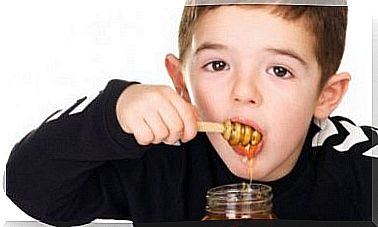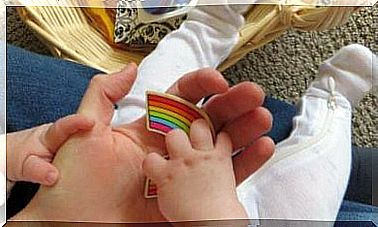How Does The Position He Occupies Between Siblings Affect?

Siblings take on a different role depending on whether they are older or younger. This is a phenomenon that occurs in all families. That is why we want to show you how the position that one occupies among siblings affects.
The order of birth can have significant effects on the personality and behavior of children. This also happens in the case of an only child, the older brother, the middle ones and the little one. This is undoubtedly a relevant phenomenon and one which deserves special attention. Similarly, it is well known that a mother’s prenatal environment changes with each pregnancy. After birth, firstborn children tend to receive more attention from their parents. With the arrival of a little brother or sister, a hierarchy is created and children choose certain roles or niches within the family to differentiate themselves.
In fact, a recent study calculated that between the ages of 4 and 13, first-born children get approximately 3,000 hours more time with their parents than their younger siblings over the same time frame.
Many think that the attention they receive makes them responsible and puts more pressure on them to do things right and succeed. Likewise, there is a tendency to think that parents are more relaxed with the children born later. Will it really be like this? Let’s see how the position held between siblings affects personality. Read on!
How does the position one occupies between siblings affect?
It is a fact that the position one occupies among siblings affects the personality. Even if they have the same parents, the same father and the same mother, in reality the children do not enjoy the same family environment.
It is indicative that the birth order has an immediate effect on the personality of the little ones. Obviously it cannot be generalized, but common characteristics can be identified and certain conclusions reached.
The first child
In most homes, a couple’s first-born is something of a testing ground for new parents. In this situation, mom and dad rely on instinct, act by trial and error and make many mistakes.

What is the consequence? Who turn into two super-attentive people and very loyal to the rules. In turn, this could make the child become a perfectionist, constantly striving to please his parents.
The second child
Conversely, it may be that when the second child arrives, the parents decide to be more permissive because of the previous experience with the firstborn.
It may happen that the second child, used to sharing the attention of mum and dad with the older brother, becomes much more independent and that, compared to the latter, does not feel the need to continually draw the attention of the parents.
Younger siblings often don’t have many responsibilities and may have more freedom to do things their way.
The middle children
For their part, children born between the first-born and the second-born tend to have a less defined personality than siblings. In fact, they can adopt the attitudes of their siblings, older or younger they are, or they can find a combination of the behaviors of both.
Plus, they typically have the ability to see things from other people’s perspective. Why? Because they always strive to be in tune with the people around them and to experience what they experience.
Only children
Only children do not need to compete with other siblings, which allows them to gain all the attention and resources of their parents, not just for a short period of time, but forever. This undoubtedly means that only children have the privilege of having all the support but also all the expectations of their parents on their shoulders.
Only children have many characteristics in common with their older siblings, even if they are less pronounced. Their behavior does not depend on a little brother or sister. They don’t feel the pressure that older siblings feel not to lose their privileged position.

Ultimately, more than the position that siblings occupy in a family, it is important to consider the fact that parents treat their children differently. This, of course, can only influence and shape children’s attitudes and behavior.
In reality, the birth order can hardly mark a child’s fate. The personality of the children is still a random mixture of the genetic particularities and the different experiences they live in childhood.
Therefore, if the birth order really pushes them in certain directions, it is just a small piece of a very, very large puzzle. Parents, of course, play a vital role in this process.









